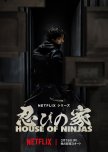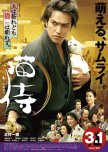
"We live and we die"
Shogun is based on the popular novel by James Clavell which in turn was very loosely based on historical events from Japan around 1600 C.E. I devoured the book years ago and watched the original mini-series starring Richard Chamberlain and Mifune Toshiro. I have been both excitedly and trepidatiously waiting for this updated version to come out. There were some improvements and also disappointments with the latest rendition.“Why is it those who have never been in battle are so eager to be in one?”
English pilot John Blackthorne is one of a handful of survivors aboard the Dutch ship Erasmus that lands in a Japanese fishing harbor. He and his men are taken prisoner by the village’s manager, Omi. Elsewhere, Lord Toranaga is called to the Osaka castle to meet with the other four regents of the Taiko’s heir who are bent on taking him down. He tells them he has no intentions of starting hostilities with them, but they intend to force him to commit seppuku. Back at Ajiro, Omi and his uncle and lord, Yabushige, decide the ship and its weapons might help them to make allies when the war starts. Though they are vassals of Toranaga they believe him to be a dead man. Before they can put any plan into action Toranaga’s right hand man, Hiromatsu, shows up laying claiming to the ship and its contents for Lord Toranaga, including Blackthorne. Toranaga has Mariko serve as Blackthorne’s interpreter as they can both speak Portuguese. All three, Toranaga, Blackthorne, and Mariko will face death and deception on numerous occasions and will have to use all of their abilities to change the fates laid out before them. The Portuguese and changing alliances of the regents and the heir’s mother’s influence are a powder keg of explosive political desires.
“A woman must stare without fear into the cruel eyes of fate and make herself seen”
Blackthorne was disappointing in this version of Shogun. Gone was the inquisitive and crafty personality along with the better relationship with Toranaga. As played by Cosmo Jarvis, he came across as a punch-drunk prize fighter. The slow build up in the book to understanding the language and world around him seemed fast tracked. Also, the key moment when his mental shift went from English to Japanese in the book was disappointingly left out. The scene would also have bookended Mariko’s emotional scene in the 9th episode. That key scene was also what caused the bonding between him and his interpreter. Shoving it in near the end of the drama felt awkward. Another awkward development was that it took a moment to figure out that when people were speaking English, it was supposed to be understood as Portuguese. In the book Latin, English, and Spanish were also spoken, so I suppose it simplified things for the actors and writers, and especially for English speaking audiences and making it more accessible to them to use just the one language. Okay, rant over. Mariko was more severe in this interpretation of her character, but she was as always highly capable and intelligent, understanding the political undercurrents of people’s actions. In fact, Mariko’s actions were as important and vital to Toranaga’s mission as any man’s, maybe more so. Like Toranaga, she was thankfully introduced earlier in this drama than in the book. There were other women who played important roles—Fuji (Fujiko) the reluctant but devoted consort, Kiku the courtesan, and Ochiba the heir’s plotting mother.
“She hides herself in the sun. Conserves her energy, waiting for her moment. You might never know she is there.”
What was well done was that they didn’t just show the story from the Englishman's perspective as an introduction to Japanese society and history. Much of the drama was in Japanese and though the political maneuverings were narrowed down for the small screen, many of the primary characters were fleshed out. Sanada Hiroyuki as Lord Toranaga gave a quietly powerful performance as the most cunning man in Japan. Toranaga was introduced early and used often to exploit his screen presence. Outwardly, Toranaga proclaimed he had no desire to be Shogun, but he used his extensive network of spies to lay in place a long-term plan to do just that. As a falconer, he broke many men to his fist. Everyone was a possible enemy and he kept his plans in his secretive heart. He even manipulated disasters to his benefit, always knowing when to use his human chess pieces and when to sacrifice them. The English pilot, Anjin, came at the right time, a chess piece that might prove valuable. Sanada’s scene with Nishioka Tokuma as Hiromatsu when all seemed lost was one of the best and most touching of the drama. The two actors traded deep feelings with flickers of their eyes and micro expressions that conveyed the depth of their friendship, loss, and commitment.
“Some are born under a banner of greatness, others must claim it”
The sets and costumes were luxurious. I wish they hadn’t been so committed to using blue filters because it looked as if the land of the rising sun was perpetually in twilight and fog. There was gore, but more for the shock value of the realistic violence without being overly gratuitous. There were scenes of sexual intimacy that also didn’t delve into gratuity. But fair warning, the writers weren’t afraid to use Clavell’s salty language.
“Loyalty does not have an end”
Despite some of my reservations about Blackthorne’s character and actor, and a few of the changes made to the story, I enjoyed this drama. The production values were of a high quality for television. Clavell had a great regard for Japan despite having been a POW during WWII. It was clear he felt Blackthorne was indeed the barbarian in need of civilizing as evidenced when the pilot met his crew later in the drama. The original mini-series didn’t subtitle the Japanese dialogue so that the audience would be as lost as Blackthorne. This time, we were treated to what was going on with the different characters as they made allies, betrayed each other, and played a dangerous game to have their man become the next Shogun or as in the case of the Portuguese, do whatever was necessary to maintain their monopoly in the region. And there were those like Yabushiga constantly trying to play both sides against the middle to survive the coming storm. Having read the book and watched the original mini-series when I was much younger, I am favorably biased toward this story. This was not a white savior tale, the book and the drama tell you who was pulling all the strings. As did the historical figure he was based upon, Blackthorne had his uses, but ultimately this was Toranaga’s journey to becoming Shogun.
“If I could use words
Like scattering flowers and
Falling leaves
What a bonfire my poems
Would make”
-Mariko
23 April 2024
Was this review helpful to you?

This review may contain spoilers
You're wonderful just as you are regardless of what planet you come from
Call Me Chihiro reminded me of Mary Poppins, if Mary Poppins had been an ex-sex worker. Like a warm breeze on a cloudy day, Chihiro brought kindness and healing to the people she came across whether it was a mischievous little boy or an ant helpless on its back. Short on plot and long on healing human interactions this film is one you experience with your heart, not your mind.Chihiro works at a Bento shop handing out warmth and food often with a gentle sense of humor. She makes friends with a small boy whose mother works nights, a high school girl whose father is at a minimum verbally abusive, a homeless man, and the blind woman married to the Bento boss. Despite her work background she never hides it from any of the people she helps. We don't know much about her except that she had a painful childhood and a traumatic experience that caused her to flee her massage parlor job.
Even though Chihiro helps the abused and downtrodden, she cannot always feel the warmth she gives. Without a second thought she buries the dead-both human and animal-afterwards taking a shower and then eating ramen. With her trans friend she explains that if love is about owning and being owned she wants no part of it. She reaches out to others yet cannot bring herself to truly feel and be open.
This film was filled with sweet, touching moments showing how kindness and healing are passed on. As the circle of people she has thrown a life vest of acceptance to begin to interact and support each, the story feels stronger and more interconnected. Yet as profoundly as Chihiro touched others she was filled with an "air of loneliness" and trying hard to run away from it; though near the end, the sun began to break through the clouds in her eyes.
One of my favorite parts of this movie is when Chihiro tells the high schooler about a client she had. He believed that people were actually aliens in human suits. The reason people don't get along is because everyone is from different planets. She and the high schooler always have their eyes open for someone who might be from their planet. What she really wants is for someone to validate her feelings and see her worth. When she thinks she's finally found someone from her planet it clearly touches her that this person thinks she is wonderful just as she is, even if she can't see that in herself.
Call Me Chihiro is a film for when you need a feel good story that doesn't require much brain power. Watching these disparate people begin to find a sense of belonging and someone who cares about them was heartwarming. It may also motivate you to see others beyond their physical appearance and faults and to discover how far one good deed can spread.
2/23/23
Was this review helpful to you?

"Will it be fun?"
Officer Black Belt takes the viewer into the world of parole officers who deal with ex-offenders who are still being monitored with ankle bracelets. In South Korea they have martial arts officers who are the muscle for the parole officers when things go wrong. Kim Woo Bin packed on 8 kg/17.5 pounds to look more imposing for his role as a directionless man who finds his direction helping to protect the parole officers and citizens of Seoul.Lee Jung Do spends his life doing what is fun. Fun for him is martial arts training where he holds third dan black belts in Taekwondo, Judo, and Kenpo. When he’s not fighting for fun he plays video games with his best buds. He also delivers fried chicken for his dad’s restaurant. On the way home one night he comes across a martial arts officer wounded in a fight and takes down the criminal. After receiving an award Parole officer Kim Sun Min offers him a temporary job while the officer recovers. Jung Do soon finds he has a natural affinity for being a martial arts officer and helping people.
Officer Black Belt had action and humor in a film dealing with a terrible subject-sexual assault and child exploitation films. Like Jung Do, most of us will want to taser certain parts off of the perpetrators’ bodies. The film went from a case of the week to an overarching villainous gang and uber-villain. Kang Ki Jung had sexually assaulted 15 children and only received 20 years in prison (that’s a little over a year per child-what is the criminal justice system thinking!!!) Jung Do and Sun Min would have to use all of their skills and put their lives on the line to prevent more children from becoming victims after he was released.
This was one of Kim Woo Bin’s stronger roles as he displayed a range of emotions as the friendly fighter who grew to enjoy the responsibilities of his job. Kim Sung Kyun as Kim Sun Min brought the bro in bromance as he guided Jung Do in his new career. Lee Hyun Geol was creepily effective as the enormous Big Bad villain. There were some continuity issues as day turned into night in a matter of seconds in several scenes. I enjoyed the first half of the film more when the officers went more by the book. In the second half they recklessly went into dangerous situations without calling for back-up. Jung Do relied on his Scooby Gang instead of looping the cops into the evidence they found which seemed irresponsible and put their lives in danger. While Taekwondo is a great competition martial art, Jung Do really needed some additional training in how to hit the vulnerable spots-eyes, ears, neck, knees-if he was going to continue fighting gangs of bad guys or with one-on-one fighting with well-trained bad guys.
Overall, Officer Black Belt was entertaining and Kim Woo Bin’s performance was engaging. There was plenty of action and the fights were well choreographed. The film didn’t break any new ground in the action arena but I did like that they attempted to shine a ray of light into the darkness. When strength was called for, they brought it, and when compassion was called for they brought that, too. To answer Lee Jung Do's question "Will it be fun?" at his interview--yes, it will be fun. When it's not terrifying.
13 September 2024
Was this review helpful to you?

The family that slays together stays together!
House of Ninjas was an entertaining mix of action, humor, and conspiracies with a little romance thrown in for good measure. Three generations living in the same house can be a source of stress on any family, especially for one that has a dark secret.After a mishap on a mission six years before, a family of ninjas may live in the same house, but they are all going in their own direction. Dad Soichi runs the failing family sake brewery and wants his family to lead a normal life. Mom Yoko is a bored stay at home mom and shoplifts in her spare time. Daughter Nagi is frustrated and puts her own spin on theft. Like his dad, son Haru wants a normal life and spends his nights refilling vending machines and having dinner in the same place so that he can be near the young woman who has her daily meal there. Retired Grandma Ninja keeps an eye on everyone, especially the youngest, Riku. The ninja code puts a crimp in Haru's love life when he is reminded that he’s not allowed to date just anyone, especially a comely reporter. When a rival ninja family reappears, the family will have to pull together to help save the nation.
House of Ninjas had a good balance of humor, romance, and bloody fight scenes. The ninja battles were entertaining and well choreographed if you don’t look too closely. The grannie-on-grannie ninja action was a hoot. The characters could make some inexplicably poor decisions at times. Apparently, ninja families are bad at interpersonal communication. When the going got tough, the family did pull together and have each others’ backs-literally. Each of the actors portrayed their characters well, glum Haru, mischievous Nagi, inquisitive Riku, and two parents who got their groove back. Throw in a deranged cult leader who thought he was god and you have everything you need for a fun ninja, excuse me, shinobi ride.
If you’re looking for a completely serious and blood-soaked drama, this isn’t it. If you are looking for a funny satire of ninjas, this isn’t it. If you are looking for a full-blown romance, this isn’t it. If you are looking for a ninja drama with high stakes, some light and dark humor, family drama exasperated by the ninja code, and a nice little romance, this could be worth a try. I found it compelling and entertaining, with some flaws.
15 February 2024
Was this review helpful to you?

This review may contain spoilers
"Times make the wrong choices, but history does not."
Song of the Bandits was a 1920's historical set on the border of China with a decidedly modern feel. It combined the Joseon independence movement with elements from a Sergio Leone spaghetti Western. Gun slingers and bar fights set to a raucous score led by the talented Kim Nam Gil made for an entertaining drama.Lee Yoon is the freed slave of Lee Kwang Il. Together they joined the Japanese army with Kwang rising in the ranks. Upon receiving a letter with the name and address of a man from Yoon's past he leaves and heads to the border settlements. He is given the gift if not of forgiveness, at least purpose to his life. He puts together a band of talented but misfit bandits. "They wouldn't come here if their brains worked right." An assassin is sent after him and as the days go by and the bandits' missions become more dangerous, the past, a love interest, the assassin, the Japanese, and big badder bandits are all set forth on a collision course that will leave a sea of spurting blood in their wake.
The cinematography and scenery were beautiful. Some of the sets might be familiar to Mr. Sunshine fans and there were also ones that came right out of a wild west town. I enjoyed the variety of music in this drama. The music was engaging, some songs rousing and others more quietly emotional. Spanish guitar was used as well as the whistling from old spaghetti westerns. The fight scenes were creative, blood spurting, and fast-no blurred knives. Much of the action was highly stylized. I particularly liked that the female assassin stayed competent and strong throughout the film with her own code of ethics.
The acting ran the gamut. Kim Nam Gil perfectly fit the conflicted bandit leader. Yoo Jae Myung made for a badass grandpa Legolas with his own checkered past. Lee Ho Jung held her own in scenes with KNG and she made Eon a compelling character. The bandits were archetypes-an axe wielding nimble ex-clown with sticky fingers, a drug addicted sharpshooter, and a mountain of a man. Each actor made their role their own. The relationship between Yoon and his ex-master Kwang felt ill-developed as if the writers couldn't decide if they truly wanted to cut the ties and make them bitter enemies despite Kwang's reprehensible actions. Seo Hyun was the biggest let down. She was unable to bring any depth or interest to her role as Hee Shin, leaving the character as bland as sand. There was no chemistry with Kim Nam Gil which meant when scenes focused on them or the fledgling romance the story ground to a stop.
I enjoyed this drama that for the most part was fast paced and coherent even if it became repetitive and ran out of steam near the end. The ending was abrupt leaving some questions unanswered despite the historical boundaries. That's not to say the drama wasn't entertaining, it was. The chemistry and camaraderie between the bandits and Yoon and Eon were fun and captivating. The scenery was stunning and the music was emotional and enthusiastic. Song of the Bandits brought to life the struggles and fragility of life while being occupied not only in Joseon but in communities on the border. Even though it would take another 25 years to drive the oppressors out, the drama showed how people long to be free and are willing to risk their lives in the face of insurmountable odds to protect their homeland, family, and friends. Whether you are a Kim Nam Gil fan or of historicals in general, this is one to give a try.
9/22/23
Was this review helpful to you?

"There's no way you can be lost if you don't set a destination"
Mr. Plankton told the story of three wounded people finding love and reconciliation down a messy, uneven path. Woo Do Hwan can make any role compelling and he had some heavy lifting to do in the early episodes of this drama, thankfully he’d been working out.Hae Jo and Gi Ho run a boys for hire service, picking whatever jobs Hae Jo thinks will be fun. Hae Jo was emotionally abandoned as a child due to a mistake at an IVF facility and seems to have no love to give. The entrepreneurs take on a job of “kidnapping” a bride which goes south really quick and ends with Hae Jo discovering he has three months to live. He decides to search for his biological father to try and make some sense of his life and in the process kidnaps another bride for real. Soon he has the first bride’s villainous gangster groom after him as well as the second bride’s loving groom.
The first few episodes were difficult for me because I had real concerns about the lack of consent on Jae Mi’s part when Hae Jo kidnapped her. Despite having a past, it came across as problematic. Of course, eventually their shared loved and Woo Do Hwan’s gorgeous face and body convinced her to help him on his parental quest, but that doesn’t negate the kidnapping. Jae Mi’s fiancé, Heung, became hopelessly entangled in their lives. I actually liked Heung. While he had mommy issues due to an overbearing mother, he was a good man who genuinely loved Jae Mi and didn’t deserve to have a front row seat to Hae Jo and Jae Mi’s burgeoning love story. Gi Ho, who became embroiled with the gangsters searching for Hae Jo suffered greatly for his loyalty and friendship which went all but unacknowledged.
Now that I’ve stated the things that didn’t work for me, here’s what did. I’m a sucker for reconciliation stories and found families. Once everyone was mutually onboard the crazy train without a destination, the story worked better. Hae Jo discovered that his family was not the only one with problems. Heung began to develop enough confidence to defy his overbearing mother. Jae Mi came to understand that she had worth. And all three would have their eyes opened to the love all around them.
Woo Do Hwan’s performance was mesmerizing even when Hae Jo behaved liked a self-centered jerk. He has a way of making any character sympathetic and did the same here which was a momentous task as Hae Jo spent much of his time hurting others. Oh Jung Se had the difficult job of making a middle-aged man who could not stand up to his mother likeable. Heung was such a compassionate character that he could set aside his own feelings and respect Jae Mi’s choices. The character that downgraded this drama for me was Jae Mi. I found the writing for her and the acting grating. Jae Mi spent much of her time yelling or acting childlike which caused me to hit the mute button numerous times per episode. All three characters were complicated and flawed, having been wounded by their parents. All three were on a journey towards love, growth, and forgiveness. Though much of the growth was understandable, there was some that felt unearned.
Mr. Plankton was an uneven drama with moments of humor, sorrow, and love driven by Woo Do Hwan’s compelling performance. The specter of Death lingered in the shadows from beginning to end. Hae Jo’s vision of what was important cleared as his final days approached. Family isn’t always what we’re born into, sometimes it’s what we make it.
“Never set a destination. Just let your instincts take the lead for you. That way you’ll never lose your path.”
11 November 2024
Was this review helpful to you?

This review may contain spoilers
"Don't give up-it's a galactic message!"
If you're looking for a taut suspenseful thriller that will keep you on the edge of your seat, Burn the House Down may not fulfill your desire. More family mystery than vengeful thriller, two sisters determine to clear their mother's name regarding a fire from thirteen years ago by taking on their greedy stepmother. Think Scooby Gang rather than The Quiet Family.Very minor spoilers:
Anzu and her sister Yuzu are convinced that Makiko, their mother's ex-friend and father's new wife burned down their childhood home thirteen years ago and destroyed their family in the process. Their mother who admitted to causing the fire is currently hospitalized with a case of amnesia and they are desperate to find evidence proving she is innocent hoping it will help her to heal. Anzu uses her best friend's name to get hired on as maid at Makiko's house. She's forbidden from going upstairs, exactly where she's hoping to search for evidence the hoarder might still have. Anzu is shocked to find Makiko's eldest son from a previous marriage is secluded in his room upstairs as he is thought to be working at a prestigious job out of the country. Kiichi suffers from agoraphobia and a really bad wig. The younger son, Shiji, is a med student and clueless and naïve Yuzu works on getting close to him. Their friend, Claire, is a computer geek who can breech any cyber security. The sisters' spineless and absent father hasn't contacted them in 13 years so Anzu's secret identity isn't hard to keep.
Burn the House Down had all sorts of plot devices to keep the story moving along: Revenge, amnesia, surprise allies, setbacks, character growth, red herrings, a little romance, and a couple of good slaps. Anzu's relationship with Kiichi was complicated and at first I wasn’t sure if it was going to be a Flowers in the Attic complication or Hannibal Lector wanting to eat her liver situation. As it turned out, Kiichi had his own guilt and burdens from the past that had crippled him. When they were children, Kiichi had given Anzu a compass and told her that the stars were always watching and they were telling her "Don't give up. It's a galactic message." Resilience and redemption were leading themes in this drama, right behind finding out who was behind the grotesque mask or in this case ugly sweater.
The sisters found out the hard way if you had to trust a shaggy looking guy who believed the stars were cheering us on or their father who hadn't sent so much as a birthday card in thirteen years, you'd better take your chances with the intergalactic messenger. As awful as Makiko was, and she was thoroughly unlikeable-a thief, egomaniacal, a homewrecker, liar extraordinaire, and completely lacking in compassion-their spineless father was even more repulsive. With the exception of Makiko and the father, the rest of the characters came in shades of gray and were mostly good people trying to find their way in the world, over and around the obstacles thrown in their paths.
As much as the drama was about discovering the truth regarding the fire, it also dealt with how people use social media to manipulate public opinion and how devastating doxxing can be. It also showed the addictive nature of having fans and needing positive affirmation from strangers. Both sides used the social media and netizens to their advantage. Makiko enjoyed having a reputation as the perfect wife, mother, cook, and housekeeper though none of those things were true. The Scooby Gang used the internet to help close in on their investigation and bait their quarry.
Despite the complex relationships and subterfuge, the drama managed to avoid falling into heavy melodrama or over the top makjang. It was a mostly light and easy thriller with a few surprises along the way. Anzu was able to put together a Scooby Gang made up of friends and family who became quite formidable. The guilty party might have gotten away with the fire if it hadn't been for those meddling kids who took the galactic message seriously and never gave up.
7/13/23
Was this review helpful to you?

This review may contain spoilers
Be 100% you, wherever you are
The Makanai is a delightful and heartwarming coming of age drama about two teenagers who travel to Kyoto to train to become Maiko. The friendships and supportive atmosphere of the yakata will welcome you in and delight you with beauty and delicious food.Close friends Kiyo and Sumire enter the world of the maiko at the age of sixteen. Sumire is a natural but Kiyo is not and is expelled. Fate as it does, plays a hand when the older cook of the house hurts her back and Kiyo steps in with her lovingly prepared meals and becomes the new makanai, fixing all the meals for the women. That is pretty much the whole plot, the story follows the two over the next year as they blossom and find their way in the world all while maintaining their friendship.
The drama does cover the lives of the “Mothers” who run the yakata and also the star geiko, Momoko. The women are supportive of each other as they face life choices, some choosing to stay and others to go. Answers to conflicts arrive as easily and gently as on a breeze. There is no hazing or jealousy, only a little friendly competitiveness and teasing. This is a glimpse behind the scenes and into the world of the maiko and those training to be one. Because one cannot be a married maiko or geiko, as the young women age, they are faced with leaving their art if they choose to marry.
More than focusing exclusively on the maiko tradition, the friendship is the heart of the drama. Kiyo and Sumire have a sismance that will inspire you. The young women are always happy, never depressed or sad living away from home. Everyone does their chores and lessons with a joyful attitude. It may not be entirely realistic but it does make for soothing viewing. The cooking and food prep is tantalizingly shot with great care. Be advised you may not want to watch this on an empty stomach as Kiyo’s dishes do look delicious!
Though the action is languorous, the scenes tend to be vibrant with conversations going on in both the fore and background. Laughter often fills the air in the cozy house. The acting is natural and approachable. This slice of life is an example of life being lived in the details.
With the exception of a boisterous and attention seeking geiko who returns after a failed marriage I found most of the main characters charming. The other exception to my enjoyment of this drama was a mai developed on Night of the Living Dead for a festival. But that’s my personal issue-I’m terrified of zombies even when portrayed by stunning maiko!
In a world that can be cold, this drama wraps you in its warm embrace and feeds you comfort food, giving you hope that your dreams can come true and that friendship can be for a lifetime.
1/14/23
Was this review helpful to you?

"Before you start complaining, why not start practicing?"
Yu Yu Hakusho had considerable story to tell with numerous characters in a very short amount of time. For the most part, and for someone completely unfamiliar with the source material, it succeeded.The story was streamlined and relatively cohesive. The main characters and their characteristics were fired out with the speed of a 22. Yusuke was the tough rebellious teenager who helped out those in distress but didn’t want anyone to know it. Keiko had been friends with Yusuke since childhood and knew all of his foibles and strengths. Kuwabara was Kusuke's rival who couldn’t help but respect the opponent he desperately wanted to beat. After the accident that transformed Kusuke’s life, a plethora of Yokai and supernatural beings were brought in as well as the requisite human baddies.
YYH covered enemies to friends, training sessions, coming of age, and the old end of the world ploy. I enjoyed the enemies to friends and strangers to friends storylines. There were backstories and characters given short shrift, but in a 5 episode drama they did a fairly good job of forming the characters. The hair and costume colors were bold. I have found it helpful when watching dramas or movies based on anime to think of them like Western superhero movies. The flamboyant hairstyles and costumes make much more sense to me now. At least no one was wearing yellow spandex, although Koenma’s pacifier was truly bizarre. One of those things that might work better in animation than live action. The CGI was well done for a drama and there was plenty of it. The episodes kept things moving with fights using supernatural weapons and abilities. The battles pulled double duty by covering up a basic story. If there was a drawback to the fights, a few of them went on too long. The acting was all over the place, from competent to-adequate, completely over-the-top, and barely registering a pulse.
Yu Yu Hakusho felt more like a long movie in some ways rather than a very short drama. As in a movie, characters were given just enough development to differentiate them and understand their motivations. With a myriad of characters involved, both good and evil, the writers managed to wedge in as much backstory and world building as they could. Overall, I found this supernatural fantasy to be comprehensible and entertaining with the forged friendships and creative fights being the highlights.
27 Dec 2023
Was this review helpful to you?

I wasn’t expecting much. In fact, I expected it to be so bad that it would be laughable. I was pleasantly surprised that this was not the case.
Kitamura Kazuki was delightful as Madarame Kyutaro the unemployed samurai living away from his wife and daughter while he tries to find a job. Nearly destitute and unable to pay his rent he is approached by the servant of a wealthy man who hires him to kill the man’s cat. The servant tells him it’s a monster cat stealing his master’s energy. Madarame finds the cat and in the last instant is unable to kill her and takes her home to his small room instead. This begins his revolutionary change from hardened, self-center warrior into a compassionate human being. He was once described as the man with the face of a devil and the heart of an angel. He let his better angels win in this drama. By slowly bonding with the cat and learning to care for her he learns more about himself and how to take care of and care for other people.
There were two moments in the drama I had to hit the pause button because I was laughing so hard. There are truly heart-warming moments and very funny ones as well.
The music was okay. The best music was when Madarame was singing his own theme song to himself and adding verses to it as he performed different tasks. Of course, it always ended with kill it or slay, slay, slay! Many episodes included him reciting a haiku or poem. With the translations it was hard for me to tell what the counts were.
The cinematography was unexpectedly beautiful. It’s rare for older dramas to have such gorgeous shots.
The only drawback to this drama was that these were some of the worst wigs I have seen in any drama. You can see the netting. Thankfully, Madarame’s wig looked great on him.
All the actors played their roles well so I have no complaints there either.
I hope I have purr-suaded you to give this meow-nificant drama a try.
I leave you with the words of the Samurai Cat.
Living in Edo
I have no money and I have no job
But I take a nap under the sunshine
What a perfect day for a cat.
εїз
Was this review helpful to you?

This review may contain spoilers
"Is it expensive because it's special, or special because it's expensive?"
Hunger followed Aoy from street food chef to the world of decadent fine dining. Thailand's class divide was explored through the world of cooking with a rather dismal view of the wealthy and the chefs who catered to them. The competition for food and domination led the main characters to define what it was they were really hungry for and what they were willing to sacrifice to sate that craving.Aoy works in her family's small, crowded restaurant. Her friends are all searching for jobs, envious that she had a job waiting on her after graduation. Tone, a sous chef for Hunger, an exclusive catering company for the extremely wealthy, gives her a card to audition for a job opening. As run down and hot as the family eatery is, Hunger is large, militantly clean and organized, and run with an iron fist by Chef Paul.
During Aoy's tenure with the volatile chef, she learns much about herself and her hunger. Initially, she hungered to be special. As she is introduced to the lavish styles of the rich and famous she yearns for some of that for herself, especially when she sees Chef Paul treated like a rock star. Chef Paul hungers to remain relevant and on top, willing to do anything necessary to stay there. When he crosses the line legally, Aoy realizes she can no longer work for the popular chef. But she goes from one frying pan into the fiery wok. A promoter named Tos hires her to be the head chef for his new restaurant. She becomes scarcely more than a marketable commodity which all comes to a head at a bacchanalia party pitting her against Chef Paul in a cook-off.
Chef Paul's disdain for the upper class that kept him in his expensive home and lifestyle was shown through the meals he prepared for them. Bloody food, red sauces dripping from lips, raw meat lowered from the ceiling in a theatrical show brought out the primal, even sacrificial instincts in the diners. They didn't have the ability to understand quality, only the showmanship and popularity of the chef. In contrast, Aoy hungered to cook with love and with the flavors that had meaning for her. She hoped to touch the place inside where familial memories remained.
Hunger asked some interesting questions. "Is it expensive because it's special or special because it's expensive?" Which begged the question in regards to Chef Paul, was his food any good or did the diners perceive it to be good because of the display and rarity of ingredients? When Chef Paul insisted a diner drag the lobster tail through a gray sauce reminiscent of clay, did it actually taste delicious or was it supposed to because of the presentation? Also, "What you eat represents your social status." Which, again, doesn't always imply quality, just more rarity of delicacies.
Hunger went beyond the desires of food and class and even briefly delved into the physical. While massaging a slice of meat, Aoy and Tone shared a primal intimate moment as they caressed each other with their meat covered hands. Tone did not share the same level of hunger for fame and success as Aoy and Chef Paul leading to problems between the two young people.
The two ambitious chefs ended up seeking different routes to satisfy their ravenous cravings to be the best. Chef Paul was willing to sacrifice anyone and anything, including his morals to remain the supreme chef to the wealthy. Aoy had to determine what she was truly hungry for. Could only the hedonistic rich crown her with success and self-esteem or could her hunger be satisfied elsewhere?
If hunger had a flaw, it would be that the hammering of the debauchery of the wealthy was done too repeatedly and without any nuance. The film did seem overly long as well. I can't say that the bloody looking plates of food seemed appealing but they did showcase Chef Paul's inner contempt for his clients.
The central thrust of the film came down to Aoy's choices. Aoy had to decide what she truly hungered for and what would satisfy that inner craving to be special. What would she be willing to part with and what did she want to embrace? Hunger may not have completely satisfied me or introduced me to anything new, but I found it comforting and not too overbaked.
4/8/23
Was this review helpful to you?

This review may contain spoilers
What we do for love
The Wedding Banquet showed what people will do for love--love for lovers, love for tradition, and love for family. The movie's title comes from a raucous and drunken wedding banquet that seemed to signal the beginning of a couple's life together. Problem was, the couple being celebrated were a sham and the real love was between a gay couple trapped in a show for one man's traditional parents from Taiwan.Wai Tung and Simon had been lovers living together happily for five years in America. Wai Tung lived a busy, upwardly mobile lifestyle by all appearances assimilated into American life. Meanwhile back in Taiwan, his parents were ready for him to be married and producing grandchildren unaware he was gay. So determined were they that they set him up in an expensive matchmaking service. Simon decided Wai Tung should marry Wai's tenant, Wei Wei, a broke artist without a green card, to help her out and get Wai's parents off his back. The ruse worked well enough that Wai Tung's parents decided to come to America for the wedding. Cue the merry marriage high-jinks and misunderstandings.
The Wedding Banquet could have veered off into slapstick comedy or morose melodrama but Ang Lee managed to walk a fine line as Wai Tung confronted his life with Simon and the expectations of his family. The comedy arose more out of character and the situations these people found themselves in rather than random sight gags much to my relief. Wai Tung loved Simon and his parents and didn't want to disappoint either. He also felt responsible for Wei Wei who was obviously in love with him. Simon also felt real as he became the odd man out while the farce took place in his home. And Wei Wei ended up facing the emotional consequences for marrying a man who loved another man. Both she and Simon came to love Wai Tung's parents. Throw in the parents with their own complicated emotions and what could have been a trite story turned meaningful and heartfelt.
The actors were all quite capable, with Gua Ah Lei giving a truly complex performance as a mother wanting her son to be happy, preferably within the confines of their traditions. Winston Chao and Mitchell Lichtenstein brought their characters to life as they bickered, loved, and fought to be together.
1993 was a different time than today. In most states gay couples were not readily accepted and marriage was out of the question. New York, for the most part, was more open-minded. This movie, without resorting to being preachy or patronizing, showed a loving gay couple working through their problems, albeit with some hilarious and heartbreaking moments. The relationship felt real and consequential. It was also a time when cell phones were as big as WWII walkie-talkies and were used for the sole purpose of a phone and to make the occasional call---minutes were expensive!
Made for only $750,000 Ang Lee poured more heart than money into this film. Even with a few rom-com contrivances, I found myself rooting for all of these people. I desperately wanted them to have their happily-ever-afters. The Wedding Banquet wasn't perfect, but it was perfectly funny and heartwarming and romantic. In the end, everyone learned a little more about love and acceptance even when they didn't come in the package that was expected.
8/4/22
Was this review helpful to you?

This review may contain spoilers
Don't drink the Kool-aid!
When Korean businessman Kang In Gu traveled to Suriname he never dreamed that he would end up between a rock and a hard place and the deep blue sea. Not only a fish out of water, but one desperately trying to stay out of the frying pan, Kang had to use all of his wiles to survive in a treacherous place dangled between a deadly Korean drug lord and a maniacal Chinese one.Kang In Gu learned early to hustle between multiple jobs to earn a living. Now with his own family he's barely making ends meet when an old school friend shows up with a business opportunity. Skate fish are popular in Korea, but the sources for the fish were dwindling. Across the globe in Suriname they were throwing the smelly fish away. All the men needed to do was to buy the strange fish cheaply in Suriname and sell them for a huge profit back home. After a problem with a local police chief and city hall employee at his karaoke bar, Kang throws in with his friend Park Eun Soo and travels halfway across the world to seek his fortune.
Kang's business experience dealing with bribes helps him in Suriname until Chinese drug lord Chen Zhen (Taiwanese star Chang Chen) lets him know that he owns the water. After a chastising phone call from his religious wife, Kang dutifully goes to church where Pastor Jeon takes him under his wing. With a little help from the "saint", Kang's skates head to Korea. All is well until the ship has to stop in Aruba where a custom's search discovers cocaine in the fish. After a brief prison stint in St. Martin's, Kang ends up working for the Korean NIS to bring Jeon down. Turns out the good pastor was also the head of a cocaine cult and one of the largest drug distributors in Europe.
Narco Saints was not particularly original in the drug and crime genre but it was well done. Reducing the drama to 6 episodes helped keep the story tight as Kang and his NIS contact navigated the dangerous waters between Jeon and Chen. The story showed how Kang was able to read Jeon and play on his and Chen's suspicions and paranoia. Quick on his feet and always willing to negotiate, NIS agent Choi came to rely on Kang's instincts in dealing with the dangerous gangs.
Ha Jung Woo brought a subtle intelligence to his role as Kang. Hwang Jung Min delivered a pleasant menace to his evil pastor without going over the top. Chang Chen as the sadistic Chinese gangster particularly had to straddle the line between menace and madness and did so well.
Narco Saints was tense right up to the end, though it did devolve into some unrealistic fight scenes. It wouldn't be the first to do so. What Narco Saints did well was show the temptation for Kang to cross over to the bad side in order to make more money than he could have ever wished for and relatively easily. He wouldn't have to work himself to death like his parents but he was also pragmatic enough to realize that Jeon's days were numbered. His journey from only wanting to make money to only wanting to survive was an interesting one.
This drama covered much of the world and involved people representing several countries. It might not have broken new ground but it did itself proud in the drug crime genre. Worth trying out if you enjoy this sort of suspenseful and violent at times story.
Was this review helpful to you?

"I'll take you along to hell"
The Whirlwind was a high stakes political drama that pitted two formidable players against each other. Lies, corruption, bribery, murder, there was nothing off the table in this deadly game for power. In the end, the winner would be the one who was willing to place all their chips on the table in a daring bet, risking everything.“Just when you think you have it under control, you find that you don’t.”
When there is an assassination attempt on the President, Prime Minister Park Dong Ho becomes the acting president. Only problem is, he’s being investigated for bribery. Dong Ho plans to use the office to rid the government of corruption and exonerate his friend who was also framed for bribery and died. Deputy Prime Minister Jung Soo Jin is determined to bring down Dong Ho due to his investigations into the Daejin Group and its control of various judges, prosecutors, and politicians such as herself. The two play a relentless game of cat and mouse always trying to stay one step of the other, never worrying about getting their hands dirty…or bloody.
“At your age, courage can be dangerous”
Just like a twister churning up everything in its path, Dong Ho and Soo Jin were willing to destroy anything and anyone in their way. Dong Ho’s powerful mesocyclone was fueled by his burning desire for justice. Soo Jin’s corrupt cloud of energy came from the need for power and influence. Dong Ho found that in order to achieve his goals, he would have to borrow the playbook of his enemies all while trying to not become what he hated. Soo Jin and the comatose president both started out fighting the dictatorship in the past but had transformed into the very things they’d fought. Political alliances changed rapidly and both manipulated the media. No one was safe with a crooked prosecutorial system and judges for hire.
“Only a greater lie beats a lie”
While The Whirlwind was intriguing it could also be exhausting. There was no room to catch a breath from the oppressive atmosphere. The whirlwind of plot twists turned and flipped in every episode. The characters’ emotions and relationships had little nuance. Everyone was taciturn and calculating with little to offer to those closest to them, even their children. Park Kyung Soo’s script never slowed down even when bouncing over enormous plot holes. Kim Hee Ae played the duplicitous Soo Jin well with one exception. I don’t know if she kept her mouth open to make it look as if she was feral and always baring her teeth or has a breathing problem but I found it distracting when she was onscreen. Sul Kyung Gu was given little emotional depth to explore and often wore the same expression from scene to scene. Kim Mi Sook as Dong Ho's Chief of Staff was the MVP for me as the person who knew who, how, and when to attack. Numerous veteran actors played unscrupulous politicians on both sides of the aisle.
“There’s only one cross”
An old saying goes, “A lie travels halfway around the world before the truth puts on its shoes. By the time the truth catches up, it’s too late.” Dong Ho quoted a variation of this and sadly it is all too true. Once a lie becomes embedded, especially a lie people want to hear, truth becomes overshadowed. Many of the things that occurred in this drama have correlations in real life around the world. A powerful corrupt leader manipulating his followers to overturn the government, manipulation of and by the media, judges taking bribes, and powerful corporations buying support for the changes they want enacted, happen all the time. In this drama, one man was willing to sacrifice everything to wipe the slate clean like a whirlwind. But how long before new players move into the void to once again purchase favors? How long before those longing for power and influence sell themselves to the highest bidder at the cost of justice? Despite its flaws, The Whirlwind was an infuriatingly compelling drama.
15 September 2024
Was this review helpful to you?

This review may contain spoilers
"The truth depends on who tells it best"
Copycat Killer was a copycat of numerous serial killer stories, set apart only by its relentless and gratuitous images of young women been tortured and murdered. Told in a time before social media, it tried to paint television news as bringing as much chaos to society as the brutal murders of imperfect victims.The drama utilized character types we’ve seen before. Chris Wu played the brilliant and moral prosecutor with a tragic past who is a thorn in everyone’s side for not tolerating any dishonesty and doggedly devoting his life to solving crimes. I found this confusing. Prosecutors in my country use the evidence police bring them to go to court and try the cases, they don’t dig up the evidence themselves. Cammy Chiang was the overly earnest young reporter disillusioned with the news media. The criminally underused Ko Chia Yen was Wu’s ex and a psychologist to help him make sense of the killers’ motivations. Ko is a gifted actress who had few scenes and none of which showed her range. Ruby Lin’s news anchor and producer had potential but the writing let her down as well. The villains ranged from mildly complex to laughable.
Copycat’s writing was uneven and the pacing slow. The first three episodes were more confusing than world building. Story lines that promised follow-ups were dropped. In the initial episode, a killer made the statement, “As long as the evil in your heart is triggered, anyone out there has the capacity to become a killer…Do you think there’s no evil in you?” The writing clumsily tried to push Wu’s prosecutor into that ethical corner. The news media was shown as morally bankrupt, uncaring of how much damage their coverage did to victims and their families as long as the ratings were high. Due to their race to air the most graphic or emotionally volatile content they became complicit in the killers’ crimes.
Aside from the writing and pacing issues, the main problem I had with this drama was its depiction of women. It tried to have it both ways-repeatedly show scantily clad women tortured and murdered in a titillating manner and then call out the media and society for blaming the victims. One character that was written for us to empathize with due to his loyalty and connection to main characters simply emphasized how unimportant young women’s lives were. The noble citizenry vilified the imperfect young women as being unworthy of justice and finding their killers a waste of tax payer money. The old myth of only the perfect victim, the chaste and obedient woman from a good family, being worthy of our sympathy or help was trotted out again and again. Perhaps Copycat was highlighting how victims and their families are often victimized as much by “righteous” people as the criminals who committed the heinous crimes but the lingering shots on chained women or extended scenes of gratuitously murdered women muddied those waters. The drama also briefly addressed the troubling old belief that the family of a perpetrator was as guilty as the criminal and not worthy of a happy life even if they had nothing to do with their relative’s actions.
Copycat Killer was a disturbing drama, not because it dealt with serial killers or had gory scenes, which it did, but because in trying to show society’s misogynistic and limited views of women they simply reinforced violence against women as a means of entertainment.
11/17/23
Was this review helpful to you?

 55
55 221
221 11
11






















